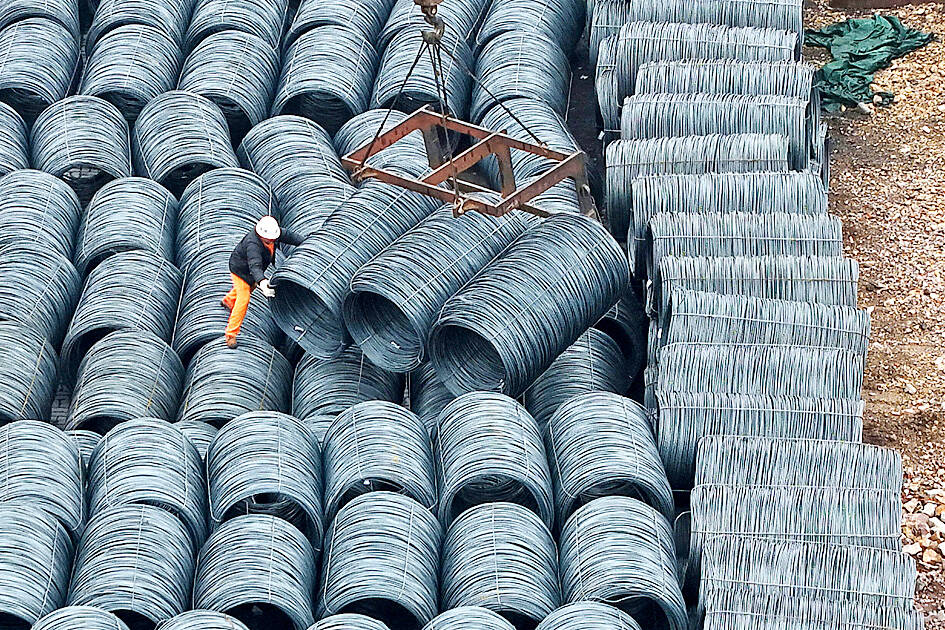Vietnam would impose anti-dumping tariffs on steel from China, following South Korea and other nations in fighting back against surging supplies from the world’s biggest producer.
Hanoi would impose temporary tariffs on some hot-rolled coils beginning early next month, the Vietnamese Ministry of Industry and Trade said on Friday.
Outside China, Vietnam is the biggest single buyer of Chinese steel, and hot-rolled coil is a major export product.

Photo: AFP
China sent the most steel overseas in nine years last year, as its producers turned to global markets to offset a deep construction slowdown at home.
That set the stage for US President Donald Trump to propose a blanket 25 percent tariff on all US imports, and has prompted nations from South Korea to Brazil and India to consider levies.
Trump’s tariffs are motivated mostly by concerns that China is flooding the global market and harming US manufacturing, said Kate Kalutkiewicz, former senior director for international trade policy at the US National Economic Council during Trump’s first term.
“They almost entirely relate to China, and China’s non-market policies and practices which have enabled this global glut,” she said. The tariffs are due to take effect on March 12.
The flurry of protectionism would pile pressure on Beijing to rein in its billion-ton steel industry after several years of slowing domestic demand.
Recent tariff decisions “should incentivize the Chinese government to launch another round of supply reform” to boost supply discipline and improve industry profitability, Citigroup Inc analysts led by Jack Shang (尚游) wrote in a note.
Vietnam’s temporary tariffs of between 19.38 percent and 27.83 percent would come into force on Friday next week and last 120 days.
China exported about 8 million tonnes of hot-rolled coils to Vietnam last year, and the tariffs would likely cover about 50 percent of that volume, Citigroup said, citing discussions with industry players.
The anti-dumping probe was triggered by Hoa Phat Group and Formosa Ha Tinh Steel Corp (台塑河靜鋼鐵興業), two major Vietnamese steelmakers who requested an investigation of imports from India and China last year. The government would not go ahead with duties on India at this moment, it said.

TAKING STOCK: A Taiwanese cookware firm in Vietnam urged customers to assess inventory or place orders early so shipments can reach the US while tariffs are paused Taiwanese businesses in Vietnam are exploring alternatives after the White House imposed a 46 percent import duty on Vietnamese goods, following US President Donald Trump’s announcement of “reciprocal” tariffs on the US’ trading partners. Lo Shih-liang (羅世良), chairman of Brico Industry Co (裕茂工業), a Taiwanese company that manufactures cast iron cookware and stove components in Vietnam, said that more than 40 percent of his business was tied to the US market, describing the constant US policy shifts as an emotional roller coaster. “I work during the day and stay up all night watching the news. I’ve been following US news until 3am

UNCERTAINTY: Innolux activated a stringent supply chain management mechanism, as it did during the COVID-19 pandemic, to ensure optimal inventory levels for customers Flat-panel display makers AUO Corp (友達) and Innolux Corp (群創) yesterday said that about 12 to 20 percent of their display business is at risk of potential US tariffs and that they would relocate production or shipment destinations to mitigate the levies’ effects. US tariffs would have a direct impact of US$200 million on AUO’s revenue, company chairman Paul Peng (彭雙浪) told reporters on the sidelines of the Touch Taiwan trade show in Taipei yesterday. That would make up about 12 percent of the company’s overall revenue. To cope with the tariff uncertainty, AUO plans to allocate its production to manufacturing facilities in

Six years ago, LVMH’s billionaire CEO Bernard Arnault and US President Donald Trump cut the blue ribbon on a factory in rural Texas that would make designer handbags for Louis Vuitton, one of the world’s best-known luxury brands. However, since the high-profile opening, the factory has faced a host of problems limiting production, 11 former Louis Vuitton employees said. The site has consistently ranked among the worst-performing for Louis Vuitton globally, “significantly” underperforming other facilities, said three former Louis Vuitton workers and a senior industry source, who cited internal rankings shared with staff. The plant’s problems — which have not

COLLABORATION: Given Taiwan’s key position in global supply chains, the US firm is discussing strategies with local partners and clients to deal with global uncertainties Advanced Micro Devices Inc (AMD) yesterday said it is meeting with local ecosystem partners, including Taiwan Semiconductor Manufacturing Co (TSMC, 台積電), to discuss strategies, including long-term manufacturing, to navigate uncertainties such as US tariffs, as Taiwan occupies an important position in global supply chains. AMD chief executive officer Lisa Su (蘇姿丰) told reporters that Taiwan is an important part of the chip designer’s ecosystem and she is discussing with partners and customers in Taiwan to forge strong collaborations on different areas during this critical period. AMD has just become the first artificial-intelligence (AI) server chip customer of TSMC to utilize its advanced